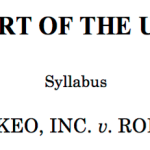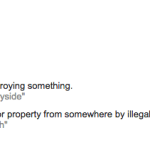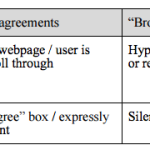
North Carolina State Supreme Court Strikes Down Cyberbullying Statute
Dillion Price, the putative victim, was the subject of Facebook discussions by his high school peers. A classmate of Price’s posted a screenshot of a sexually themed text message Price allegedly sent him. Commentary ensued, and defendant Robert Bishop commented…
Scraping Lawsuit Survives Dismissal Motion–CouponCabin v. Savings.com
We blog pretty much every scraping case we see; we just don’t see many of them. As I’ve told you before, scraping is ubiquitous but of dubious legality. Today’s case reiterates just how hard it is for scrapers to win…

Will the Spokeo v. Robins Supreme Court Ruling Favor Plaintiffs Or Defendants? Uh…
The Supreme Court issued its opinion in Spokeo v. Robins. A six Justice majority reversed the Ninth Circuit’s decision on the basis that the Ninth Circuit did not sufficiently consider whether Mr. Robins’s alleged harms were “concrete.” On the question…

Judge Scolds Litigant For Making Facebook Account “Private” During Litigation–Thurmond v. Bowman
This is a social media evidence ruling. Plaintiff filed a Fair Housing Act lawsuit alleging that a prospective landlord decline to rent an apartment after learning that two of plaintiff’s children would be living with her. The lease denial allegedly…

Facebook Gets Bad Ruling In Face-Scanning Privacy Case–In re Facebook Biometric Information Privacy Litigation
The plaintiffs allege Facebook’s face-scanning functionality (that underlies its “tag suggestion” feature) violates the Illinois Biometric Information Privacy Act. Several lawsuits were originally filed in Illinois, but the parties agreed to transfer the cases to the Northern District of California,…

Important and Troubling Video Privacy Protection Act (VPPA) Ruling From First Circuit–Yershov v. Gannett
This is a Video Privacy Protection Act case alleging that Gannett, the owner of USA Today, improperly disclosed personally identifiable information to Adobe. Adobe offers analytics services to its clients by collecting user information and building user profiles. As alleged…

Q1 2016 Quick Links, Part 3 (DOJ v. Apple, ISIS, Censorship & More)
Surveillance * The whole Apple v. DOJ fracas was insane! NY Times: In Nod to Law Enforcement, Obama Ends Attempt to Straddle Privacy Divide. Vice: Obama’s Call for Encryption ‘Compromise’ Is Hypocritical. NY Times: For Apple, a Search for a…

Does Two-Factor Authentication Violate the TCPA?–Duguid v. Facebook
Plaintiff sued Facebook alleging TCPA claims on behalf of a putative class. Facebook sends text messages when someone logs in to their account via a new or unrecognized device. Plaintiff was a non-Facebook user who received these messages. Unfortunately, despite…

Surveying Ten Years Of Top Internet Law Developments (Forbes Cross-Post)
I’ve been writing an annual list of top Internet Law developments for a decade, so I thought it might be fun to look back at my #1 ranked development in each of the past 10 years. Let’s take a stroll…

Google Can Derive Undisclosed Economic Benefits From CAPTCHAs–Rojas-Lozano v. Google
This lawsuit alleges that Google benefits unfairly from consumers’ responses to Google’s CAPTCHA. Plaintiff, a Massachusetts resident, responded to a two word CAPTCHA prompt when signing up for a Gmail accout. She alleged that only one of the two words…
